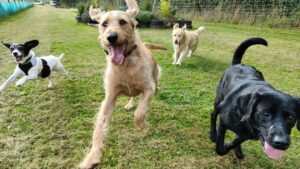 In the intricate web of animal welfare, the journey towards finding loving homes for shelter animals often encounters roadblocks in the form of behavioral challenges. These challenges, ranging from fear and anxiety to undesirable behaviors, can significantly hinder an animal’s chances of adoption and long-term success in a home environment. However, within the constraints of under-budgeted and under-staffed shelters, lies an opportunity for innovation, resourcefulness, and unwavering dedication to the well-being of every animal in our care. Let us embark on a transformative exploration of behavioral rehabilitation, uncovering the strategies and principles that empower shelters to nurture the minds and transform the lives of shelter animals. Continue reading “The Power of Behavioral Rehabilitation in Under-Budgeted and Under-Staffed Shelters”
In the intricate web of animal welfare, the journey towards finding loving homes for shelter animals often encounters roadblocks in the form of behavioral challenges. These challenges, ranging from fear and anxiety to undesirable behaviors, can significantly hinder an animal’s chances of adoption and long-term success in a home environment. However, within the constraints of under-budgeted and under-staffed shelters, lies an opportunity for innovation, resourcefulness, and unwavering dedication to the well-being of every animal in our care. Let us embark on a transformative exploration of behavioral rehabilitation, uncovering the strategies and principles that empower shelters to nurture the minds and transform the lives of shelter animals. Continue reading “The Power of Behavioral Rehabilitation in Under-Budgeted and Under-Staffed Shelters”
Innovative Approaches to Medical Rehabilitation: Incremental Veterinary Care
Understanding Incremental Veterinary Care in the Shelter Environment
At its core, incremental veterinary care is a case management strategy that empowers shelter veterinarians to make informed decisions about the allocation of limited resources based on the individual needs of each patient and the overall welfare of the shelter population. This approach acknowledges the inherent financial constraints of shelters while prioritizing the well-being of the animals under their care. Continue reading “Innovative Approaches to Medical Rehabilitation: Incremental Veterinary Care”
Cultivating Compassionate Communities: Harnessing the Power of Community Engagement and Education in Animal Welfare

As a fervent advocate for animal welfare, I have witnessed firsthand the profound impact that community engagement and education can have in transforming the lives of animals and the communities they inhabit. By empowering individuals with knowledge, instilling a sense of responsibility, and fostering empathy towards animals, we can effectively address the root causes of pet overpopulation and relinquishment rates. Let us embark on a journey into the many ways community engagement and education can serve as catalysts for positive change in the realm of animal welfare. Continue reading “Cultivating Compassionate Communities: Harnessing the Power of Community Engagement and Education in Animal Welfare”
Unleashing Hope: Building Thriving Foster Care Networks
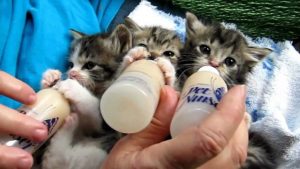 In the realm of animal welfare, few strategies possess the transformative potential and cost-effectiveness of foster programs for under-budgeted and short-staffed shelters. Foster care networks, when cultivated strategically and with community engagement at the forefront, have the power to alleviate overcrowding, reduce stress on shelter animals, and amplify the impact of shelters in their mission to save lives. Let’s explore the nuances of establishing and expanding foster care networks, unlocking their potential to become a cornerstone of compassionate animal care. Continue reading “Unleashing Hope: Building Thriving Foster Care Networks”
In the realm of animal welfare, few strategies possess the transformative potential and cost-effectiveness of foster programs for under-budgeted and short-staffed shelters. Foster care networks, when cultivated strategically and with community engagement at the forefront, have the power to alleviate overcrowding, reduce stress on shelter animals, and amplify the impact of shelters in their mission to save lives. Let’s explore the nuances of establishing and expanding foster care networks, unlocking their potential to become a cornerstone of compassionate animal care. Continue reading “Unleashing Hope: Building Thriving Foster Care Networks”
Practical consequences of the no-kill ethic By Ed Boks
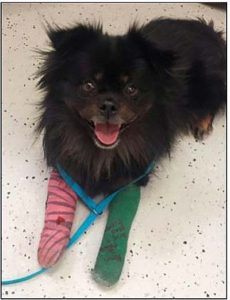
Although the Yavapai Humane Society (YHS) has been providing animal shelter services to our community for 43 years, it was only five and a half years ago that YHS embraced what we have come to call our “no-kill ethic.” We define this ethic as applying the same criteria to determining a homeless pets’ fate that a pet owner or conscientious veterinarian would apply to a beloved family pet. That is, healthy and treatable animals are not euthanized (killed) simply because of a lack of resources.
Once this life-affirming ethic was implemented, the practical consequences immediately began to fall into place. Embracing and practicing the no-kill ethic has resulted in our community becoming the region in the United States for dogs and cats – for five consecutive years. Euthanasia/killing has been effectively eliminated as a tool to control pet overpopulation in our community and overcrowding in our shelter. Killing has been replaced by a robust low-cost spay/neuter and pet identification (microchip) programs. Spay/neuter programs reduce the number of unwanted pets and pet identification programs allow for the quick return of lost pets to their frantic owners.
A perfect example of an animal benefiting from the YHS no-kill ethic is Ziggy – a 2-year-old intact male Tibetan spaniel mix. Ziggy was found by animal control on Dec. 1. He was abandoned by his owners with an apparent broken leg.
Upon arrival, the YHS medical team found Ziggy had suffered severe trauma. X-rays revealed two broken legs: his right front leg had fractures of the radius and ulna and his left front leg had metacarpal fractures. We splinted both front legs and started him on pain medications. YHS veterinarian consulted with a private practice veterinary orthopedic surgeon.
The decision was made to transport Ziggy to a local veterinary hospital in Phoenix where Ziggy was examined and immediately scheduled for surgery. His multiple fractures were repaired with plates, screws and a tension splint. Ziggy’s recovery is expected to take 6 to 8 weeks and is made possible thanks to YHS’ compassionate foster care giving volunteers. The orthopedic surgeon felt the fractures could be old injuries suggesting criminal cruelty and neglect may have been involved.
Typically, the cost for this surgery would exceed $4,300; however, the private veterinarian graciously agreed to charge YHS only $2,800 for this lifesaving surgery. Ziggy is now a STAR Animal.
STAR (Special Treatment And Recovery) is a donation funded program designed to ensure animals in critical need of medical care beyond the scope of the YHS budget are not denied the care they need to survive. These animals are sadly routinely euthanized in many other shelters.
If you would like to help animals like Ziggy please make sure your local shelter has a STAR Program you can make a tax deductible donation. Your donation will help ensure your local shelter has the funds available to help the next rescued animal in need of life saving medical care.
YHS receives Community Excellence Award by Ed Boks
This past Friday, July 10 at the Prescott Resort, the Yavapai Humane Society (YHS) was recognized by the Prescott Valley Chamber of Commerce at their 2015 Community Excellence Awards ceremony. YHS was honored as “The Organization of the Year.” Among the many YHS accomplishments cited by the Chamber, the impact of our no-kill ethic was particularly singled out.
The Yavapai Humane Society (YHS) celebrated its 43rd Anniversary in March, however, it was only five years ago this month that YHS first embraced its no-kill ethic.
The no-kill ethic refers to our commitment to apply the same criteria when deciding an animal’s fate that a caring pet owner or compassionate veterinarian would apply to a beloved pet. That is, healthy and treatable animals are not killed simply because of a lack of resources. Believe it or not, that was happening just five years ago.
Killing animals because of a lack of resources may be the quick, convenient and, at least from afar, the easy thing to do. But I have never, in over 30 years in this field, heard anyone argue it is the right thing to do. After all, the creatures who fill our shelters can hardly be faulted for bringing trouble upon themselves. People who excuse euthanasia in shelters often say we have to be “realistic.” But we contend such realism is best directed at the sources of the problem and at the element of human responsibility.
It is gratifying to be recognized by the Prescott Valley Chamber of Commerce for the remarkable transformation the no-kill ethic has had on our community. In fact, YHS’ no-kill ethic is gaining attention in communities coast to coast. Organizations in Los Angeles, Mohave County, New York City and even the country of Israel have asked YHS for help embracing our no-kill ethic.
YHS is fast becoming a world class organization. This growth has required every member of the YHS team to expand their individual capacity, vision and expertise. Working for YHS is no longer just a job; it’s not even just a career – it’s a vocation. I’m proud of every member of our team for getting us to where we are today; but even more exciting is where we’re taking YHS in the years ahead. If you are not a part of this life affirming effort, I invite you to join the YHS volunteer team.
Other reasons cited by the Prescott Valley Chamber for selecting YHS as “The Organization of the Year” include our many lifesaving programs that ensure appropriate care is provided for every lost, homeless, sick and abused animal we rescue until we find them their forever home. YHS successfully “re-homes” 97 percent of the pets who come through our doors (compared to the national shelter average of about 40 percent). The 3 percent who are humanely euthanized are due to irremediable suffering resulting from disease or injury, or aggression that threatens public safety.
The Chamber also called attention to YHS humane response to the significant increase in the number of animals rescued from hoarding situations (over 70 animals in the past 12 months compared to 20-30 animals in previous years); the recent expansion of the YHS New Hope program, which enables YHS to rescue animals from kill lists in shelters across the Southwest – effectively exporting the no-kill ethic; and YHS plans to include homeless equines in its rescue mission as early as 2016.
It is gratifying to be recognized as our community’s “Organization of 2015” for providing a broad and compassionate safety-net for animals in greatest need. This award is deeply appreciated by the Board of Directors, employees and volunteers of YHS.
YHS needs your help for blood analysis equipment By Ed Boks
The Yavapai Humane Society (YHS) is celebrating its 42nd anniversary, and we hope to further expand our “no-kill” ethic in 2014. Many still ask what no-kill means, while others ask if it is even possible.
I define “no-kill” as applying the same criteria to deciding a shelter animal’s fate that a devoted pet owner or conscientious veterinarian would apply to a beloved pet. That is, healthy and treatable animals are not killed simply because we lack the resources to care for them.
YHS is not a no-kill shelter; however, since the YHS Board of Directors and management team embraced the “no-kill ethic” in July 2010, we achieved a 93 percent decrease in shelter killing. If no-kill were an Olympic event we would no doubt rejoice in our success. However, while achieving no-kill is similar to an Olympic moment, sustaining no-kill is a marathon – and each day presents many life-and-death challenges to continue to hold the line.
YHS is the largest animal rescue organization in northern Arizona. We are increasingly known for our many life-saving programs, which are responsible for making central and western Yavapai County the safest region for pets in the United States.
So effective are our life-saving programs that often the only animals most at risk of euthanasia or delayed care are those with medical issues we are challenged to diagnose because we lack the necessary blood analysis equipment.
Consequently, YHS must rely on local labs to provide these services at considerable cost. Often YHS just can’t afford these lifesaving services, and when we can it requires YHS staff or volunteers to spend precious time transporting samples to the lab and awaiting results. Many times an animal doesn’t have the time it takes to get those results.
Historically, YHS euthanized suffering animals when we were unable to determine the full extent of an illness. If YHS had a blood analysis machine the likelihood of a rescued sick pet’s survival would increase exponentially.
To ensure every ill animal that YHS rescues has a fighting chance at quality life requires this equipment on-site. This vital equipment will allow YHS to treat these critical needs animals efficiently and humanely – and it will save more lives.
In just the first quarter of 2014, YHS submitted 55 samples to local labs for analysis at an average cost of about $65. The cost for this equipment is about $20,000. If YHS had this equipment on site it would pay for itself 18 months.
This is YHS’s 42nd Anniversary. If 42 individuals could find it in their heart to give $475, YHS could secure this equipment this year. What a 42 Anniversary present for our community’s neediest animals!
If you are able to help in this life-saving effort, please mail your donation to the Yavapai Humane Society’s STAR (Special Treatment And Recovery) Program.
If you can’t afford $475, any gift towards this essential need will be greatly appreciated. Any monies above the $20,000 will go to the STAR program which provides critical medical care to sick and injured homeless animals.
Ed Boks is the executive director of the Yavapai Humane Society.
Hypothyroidism is no reason not to adopt a dog; Roseanne’s story by Ed Boks
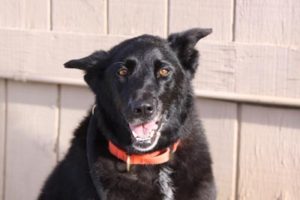
The Auburn University School of Pharmacy estimates 3 to 8 percent of the American human population have hypothyroidism, and the incidence increases with age. I was surprised by this number because when I conduct a poll among friends and acquaintances the percentage seems much higher. Everybody I asked seems to be on thyroid medication. So I’m hoping Roseanne’s story finds an empathetic audience.
Roseanne is a 7-year-old female Labrador Retriever mix surrendered to YHS by her owner because of Roseanne’s medical condition. This happened on Saturday, June 17. From day one, Roseanne captured the heart of employees and volunteers alike. To say Roseanne has personality is an understatement. In fact, she is borderline mischievous – with a heart of gold.
Roseanne is the most popular dog at YHS. Everybody who meets her wants to adopt her on the spot. That is, until they learn she has hypothyroidism.
The YHS medical team diagnosed Roseanne’s hypothyroidism after noticing a slight head tilt that gradually became worse. Hypothyroidism is a common disease in dogs and occurs when the thyroid gland produces insufficient hormones to regulate the metabolism. This causes a variety of symptoms including weight gain or obesity, hair loss and skin problems. Most hypothyroid dogs respond readily to treatment.
Roseanne has been on treatment (a pill in his food morning and night) for several weeks and her desire to play and be more active is palpable; and her coat has improved too. Many dogs suffer from a low thyroid hormone level for years without treatment. If your dog has recurrent skin problems, or unexplained weight gain, she may be suffering from hypothyroidism and you should talk with your veterinarian.
Although the onset of clinical signs is variable, hypothyroidism most commonly develops in middle-aged dogs between the ages of 4-to-10 years. The disorder usually affects mid- to large-size breeds, and is rare in toy and miniature breeds. Breeds that appear predisposed to the condition include the Golden Retriever, Doberman Pinscher, Irish Setter, Miniature Schnauzer, Dachshund, Cocker Spaniel and Airedale Terrier. German Shepherds and mixed breeds appear to be at a reduced risk for contracting the disease.
Hypothyroidism in dogs is easy to treat. Treatment consists of placing the dog on a daily dose of a synthetic thyroid hormone called thyroxine (levothyroxine). The dose and frequency of administration of this drug varies depending on the severity of the disease and the individual response of the dog to the drug. A dog is usually placed on a standard dose for her weight and blood samples are drawn periodically to check her response and then the dose is adjusted accordingly. Once therapy is started, the dog will need to be on treatment for the rest of her life. Usually after the treatment is started, the majority of the symptoms resolve.
Roseanne’s improvement is obvious; she lost 17 pounds, weighing in now at a svelte 79 pounds. Her head tilt has also vanished. She is ready to be adopted into an understanding home. If you are interested in adopting Roseanne, come by YHS at 1625 Sundog Ranch Road in Prescott, off the Prescott Parkway for a get acquainted meeting. Roseanne is a senior dog so adoption fees are waived for citizens 59 years of age; $40 for all others.
If you would like to make sure dogs like Roseanne get the medical care and treatment they need, please make a donation to the Special Treatment And Recovery (STAR) program at your local shelter.
Much to celebrate at the Yavapai Humane Society by Ed Boks
The Yavapai Humane Society (YHS) is celebrating its 40th anniversary this year. I launched the year with a column explaining how wonderful it would be if YHS could celebrate this milestone year with a new X-ray machine.
Thanks to the generosity of several individuals and a significant gift from a foundation wishing to remain anonymous, YHS was able to purchase this life-saving equipment. I want to publicly thank all those who made this miracle a reality!
An X-ray machine significantly enhances YHS’s ability to diagnose and treat critical-needs animals more efficiently and humanely – resulting in more lives saved. The X-ray machine helps ensure every critically injured or severely ill animal YHS rescues has a fighting chance at a quality life.
Now that YHS has this wonderful tool, I am making a special plea for donations to our Special Treatment and Recovery (STAR) fund. Donations to the STAR program provide funds to care for the medical needs of animals that might be euthanized otherwise. The STAR fund is where we go when we need special medicines, X-rays, medical tests and reconstructive surgeries that our budget just can’t support.
Through the STAR program the entire community can participate in making sure injured and sick animals receive the care they need. Please consider making a contribution to this special program.
Speaking of our 40th anniversary celebration, be sure to save the date for this year’s Reigning Cats & Dogs Dinner and Auction Gala on Saturday evening, Sept. 8, at the Prescott Resort.
A special feature this year is the 40th anniversary essay contest called “40 Years of Saving Lives, 40 Years of Memories.”
You are invited to share your personal heart-warming animal story in the form of an essay (500 words or less), poem, song, video or photograph. Humorous or heart-tugging entries with a direct association with YHS are welcomed. Entries are limited to three. Entries will be submitted to the judges anonymously, making the contest open to all, including volunteers and former and current employees. There are no age limitations.
The grand prize is two tickets to the Reigning Cats & Dogs Gala where the winning entry will be recognized ($200 value).
The first runner-up will win a certificate for a free spay or neuter surgery for a family pet or a friend’s pet at the YHS Spay/Neuter and Wellness Clinic (up to $100 value). The second runner-up will win a $25 gift certificate to the YHS Thrift Shop. All winners and honorable mentions will be featured on the YHS website.
Entry deadline is Sunday, Aug. 12, 2012; winner notification is Friday, Aug. 17, 2012. Be sure to include your name, address, phone number and email address. By submitting your entry, you permit YHS to reproduce it on the YHS website and other media.
The power of a STAR Program to save lives By Ed Boks
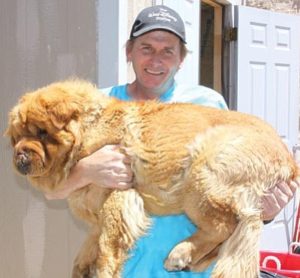
Local shelters and rescue organizations exist to help save the lives of lost and homeless pets who have no one else to turn to.
Sally is such a case. Sally is a 3-year-old female sharpei-chow mix, although she behaves more like a giant teddy bear. It is difficult to understand how someone could lose such a sweet animal. Animal Control first spotted Sally running the streets in late April. Tried as they might, she proved elusive despite what appeared to be a broken leg.
Fortunately, persistence paid off, and Sally was finally rescued on May 3 and brought to YHS. Unfortunately, she did indeed have a broken left hind leg. Both her tibia and fibula were broken in two. She was also badly flea-infested. The flea infestation was easily remedied. Not so easy to remedy was her broken leg.
To save her leg, Sally required a surgical repair that included placement of a bone plate to realign the bone fragments, immobilize the fracture and allow healing. She also had entropion – a chronic eye condition resulting from her eyelids rolling inward. This condition can result in ulcers and even blindness if left untreated. Corrective surgery to her eyelids was also necessary.
These medical needs qualified Sally for our STAR (Special Treatment And Recovery) program. STAR provides medical care to abused, neglected, injured and sick animals rescued by the Yavapai Humane Society (YHS). Lost, homeless and abandoned pets with poor medical conditions tend to be dismissed as adoption candidates by many shelters even though these animals could be treated if only the funds were available.
Thanks to our STAR Program, funded by donations from generous supporters, YHS is able to provide animals like Sally the time and treatment they need to recover. This is done with the help and support of local veterinarians and foster care families able to provide safe haven to an animal for the recovery period.
Sally was particularly fortunate in that she had two veterinary “champions” volunteering to help with her surgery. YHS is thankful for and dependent on our veterinary partners. Without their support, animals like Sally would have no chance at survival. Our local veterinarians are truly every day heroes!
Sally’s surgery was successful saving her life. She is now in foster care until her recovery is complete, at which time she will be available for adoption.
A local veterinarian’s compassion made Sally’s surgery possible. But it would not have been possible without your donations to our STAR program. If you want to help animals in distress, animals like Sally, please make sure your local shelter has a life-saving STAR Program you can help support. Without a coordinated commpassionate community veterinarian partners and shelter volunteers, these animals would truly be hopeless. By working together your community can be among the safest communities in the nation for pets – owned, lost, and homeless.
Ed Boks is the executive director of the Yavapai Humane Society.
